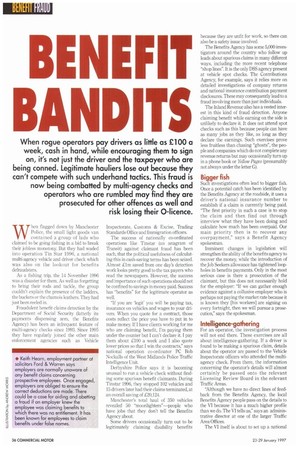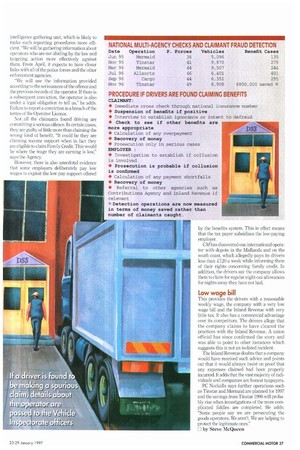B 11 FIT BAND
Page 38

Page 39

If you've noticed an error in this article please click here to report it so we can fix it.
When rogue operators pay drivers as little as E100 a week, cash in hand, while encouraging them to sign on, it's not just the driver and the taxpayer who are being conned. Legitimate hauliers lose out because they can't compete with such underhand tactics. This fraud is now being combatted by multi-agency checks and operators who are rumbled may find they are prosecuted for other offences as well and risk losing their 0-licence.
When flagged down by Manchester Police, the small light goods van contained a group of lads who claimed to be going fishing in a bid to break their jobless monotony But they had waded into operation Tin Star 1996, a national multi-agency vehicle arid driver check which was also on the lookout for benefits defraudsters.
As a fishing trip, the 14 November 1996 was a disaster for them. As well as forgetting to bring their rods and tackle, the group couldn't explain the presence of the ladders, the buckets or the chamois leathers. They had just been reeled in.
Fraudulent benefit claims detection by the Department of Social Security (latterly its payinents dispensing arm, the Benefits Agency) has been an infrequent feature of multi-agency checks since 1993. Since 1995 they have regularly joined the other main enforcement agencies such as Vehicle Inspectorate, Customs & Excise, Trading Standards Office and Immigration officers.
The success of nationally co-ordinated operations like Tinstar (an anagram of Transit) against claimant fraud has been such, that the political usefulness of calculating this in cash-saving terms has been seized. Almost .Elm saved from one day's detection work looks pretty good to the tax payers who read the newspapers. However, the success and importance of such operations should not be confined to savings in money paid. Success has "benefits" for the legitimate operator as well.
"If you are 'legit' you will be paying tax, insurance on vehicles and wages to your drivers. When you quote for a contract, those costs reflect the price you have to put in to make money. If! have clients working for me who are claiming benefit, I'm paying them under the counter but I can't declare it I pay them about 1;100 a week and I also quote lower prices so that I win the contracts," says national operation co-ordinator PC Bob Nockalls of the West Midlands Police Traffic Intelligence Unit.
Derbyshire Police says it is becoming unusual to run a vehicle check without finding some spurious benefit claimants. During Tinstar 1996, they stopped 102 vehicles and 15 drivers later had their claims terminated, at an overall saving of £20,124.
Manchester's total haul of 350 vehicles revealed 50 "moonlighters"—people who have jobs that they don't tell the Benefits Agency about.
Some drivers occasionally turn out to be legitimately claiming disability benefits because they are unfit for work, so there can also be a safety issue involved.
The Benefits Agency has some 5,000 investigators around the country who follow up leads about spurious claims in many different ways, including the more recent telephone "shop lines". It is the only DSS agency present at vehicle spot checks. The Contributions Agency, for example, says it relies more on detailed investigations of company returns and national insurance contribution payment disclosures These may consequently lead to a fraud involving more than just individuals.
The Inland Revenue also has a vested interest in this kind of fraud detection. Anyone claiming benefit while earning on the side is unlikely to declare it. It does not attend spot checks such as this because people can have as many jobs as they like, as long as they declare the earnings. Such exercises prove less fruitless than chasing "ghosts", the people and companies which do not complete any revenue returns but may occasionally turn up in a phone book or Yellow Pages (presumably not always under the letter G).
Bigger fish
Such investigations often lead to bigger fish. Once a potential catch has been identified by the Benefits Agency at the roadside, it uses a driver's national insurance number to establish if a claim is currently being paid. "The first priority in such a case is to stop the claim and then find out through interview what they have been doing and calculate how much has been overpaid. Our main priority then is to recover any overpayment," says a Benefit Agency spokesman.
Imminent changes in legislation will strengthen the ability of the benefits agency to recover the money, while the introduction of the Job Seekers allowance has tightened loopholes in benefits payments. Only in the most serious case is there a prosecution of the claimant, but this does not necessarily hold for the employer: "If we can gather enough evidence against a collusive employer who is perhaps not paying the market rate because it is known they [his workers] are signing on every fortnight, then we will pursue a prosecution," says the spokesman.
Intelligence-gathering
For an operator, the investigation process will not end there, These exercises are all about intelligence-gathering. If a driver is found to be making a spurious claim, details about the operator are passed to the Vehicle Inspectorate officers who attended the multiagency check. From there, the information concerning the operator's details will almost certainly be passed onto the relevant Licensing Review Board in the relevant Traffic Areas.
"Although we have no direct lines of feedback from the Benefits Agency, the local Benefits Agency people pass on the details to the VI because it has a much higher profile than we do. The VI tells us," says an administrative director at one of the larger Traffic Area Offices.
The VI itself is about to set up a national intelligence gathering unit, which is likely to make such reporting procedures more effident. "We will be gathering information about operators who are not abiding by the law and targeting action more effectively against them. From April, it expects to have closer links with all of the police forces and the other enforcement agencies.
"We will use the information provided according to the seriousness of the offence and the previous records of the operator. If there is a subsequent conviction, the operator is also under a legal obligation to tell us," he adds. Failure to report a conviction is a breach of the terms of the Operator Licence.
Not all the claimants found driving are committing a serious offence. In certain cases, they am guilty of little more than claiming the wrong kind of benefit. "It could be they are claiming income support when in fact they are eligible to claim Family Credit. This would be where the wage they are earning is low," says the Agency However, there is also anecdotal evidence that some employers deliberately pay low wages to exploit the low pay support offered by the benefits system. This in effect means that the tax payer subsidises the low-paying employer.
CMlias discovered one international operator with depots in the Midlands and on the south coast, which allegedly pays its drivers less than £120 a week while informing them of their rights concerning family credit In addition, the drivers say the company allows them to claim for regular night-out allowances for nights away they have not had.
Low wage bill
This provides the drivers with a reasonable weekly wage, the company with a very low wage bill and the Inland Revenue with very little tax. It also has a commercial advantage over its competitors. The drivers allege that the company claims to have cleared the practices with the Inland Revenue. A union official has since confirmed the story and was able to point to other instances which suggests this is not an isolated incident.
The Inland Revenue doubts that a company would have received such advice and points out that it would always insist on proof that any expenses claimed had been properly incurred. It adds that the vast majority of individuals and companies are honest taxpayers.
PC Nockalls says further operations such as Tinstar and Mermaid are planned for 1997 and the savings from Tinstar 1996 will probably rise when investigations of the more complicated fiddles are completed. He adds: "Some people say we are persecuting the goods operators. We aren't. We are helping to protect the legitimate ones."
El by Steve McQueen
































































































